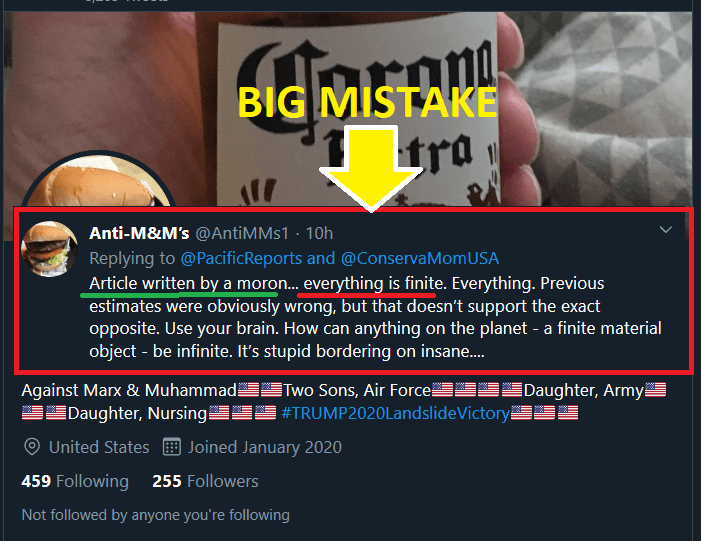
I suppose I should thank @AntiMMs1 for giving me the opportunity to show off a sliver of my vast knowledge. @AntiMMs1’s scathing reply was in response to my article below. I made no such claim that oil is not a finite resource. It is apparent that @AntiMMs1’s reading comprehension is dismally low. I wrote the article to provide amusement to my readers and to provoke thought as to why Russia and Saudi Arabia are pumping their oil reserves at near capacity in the absence of demand at $13.56 a barrel.
Let’s look at @AntiMMs1’s claim that ‘everything is finite‘. I won’t have to break an intellectual sweat to prove that claim is wrong. I have studied the universe for the last twelve years. Would it surprise you if I told that space is infinite in both directions? A hundred years ago astronomers believed our universe was only comprised of our galaxy, the Milky Way. When the telescope technology advanced sufficiently, the astronomers discovered that what had been thought to be very distant stars were in fact, galaxies that were billions of light-years away from us.
At that same time, scientists thought that the universe would end in “The big crunch”. It was thought that once the Big Bang’s inertia on the universe’s matter was exhausted; gravity would draw all matter to one point in the universe. In this period there were two men that would forever change our understanding of the universe, Einstein, and Hubble.
Einstein had written his paper on the Theory of Relatively. Einstein’s theory changed our understanding of gravity and light. Einstein correctly predicted the red and blue shift in the doppler effect when light is traveling away from us [red shift] or toward us [blue shift]. Einstein’s theory also states that mass doesn’t exert an attractive force. Mass warps space.
In the meanwhile, Hubble had observed color shifts in galaxies and he pondered its meaning. Here is the payoff for you that disproves @AntiMMs1’s claim that ‘everything is finite’. After Hubble read Einstein’s paper, Hubble was able to make his calculations on these red-light shifts that these galaxies were displaying. Not only were these galaxies moving away from us, but the observed galaxies were also in a state of acceleration. Thereby, the universe is in a constant state of expansion. Thus, the universe is not finite.
Pardon me while I indulge myself a little longer in my showing off. Astronomers got the bright idea to focus the Hubble space telescope on a patch of space that was devoid of any stars. I don’t recall the exact exposure time, but it was something like 14 days. Many thought it was a waste of time. That Hubble telescope exposure informed us that the universe is far larger than had been previously thought. That exposure revealed over ten thousand galaxies that are 47 billion light-years away from us. Those individual light photons had traveled 47 billion light-years to strike the Hubble telescope’s exposure plate[s]. So light does not have a finite restriction distance that it can traverse. Light can travel infinitely as long as it does not strike an object
A photon has no mass. Thus, gravity will not act upon it. But if Einstein’s theory is correct, when light passes a large mass like a star, the light will follow the warp in space. Hence, from the observer’s point of view, the path of the light from a distant star will be shifted from its proper position. This experiment has been repeated many times in our modern era.
It is just sad that @AntiMMs1 is so ignorant. The information I have shown is readily available online. I suppose I haven’t accounted for @AntiMMs1’s ability to comprehend such information. Read my article below to confirm that I didn’t state oil was not a finite resource.
Update 4/24/2020
I received a complaint from @AntiMMs1 that he was speaking to his belief that ‘everything is finite’ on this planet. Which is again a flagrant display of astounding ignorance. One has only to look at the creation of new land by volcanic action to know his statement is false. The man-made creation of freshwater from seawater is another obvious example. These two examples are low hanging fruit from which AntiMMs1 failed to pluck. An intellectual giant, he’s not.
I want to share some obscure trivia. The word, planet means wandering star in Greek. The ancient Greeks named the constellations. They mistook the planets in our solar system for stars.
Published by Chief Editor, Sammy Campbell. Written by Mark Pullen.